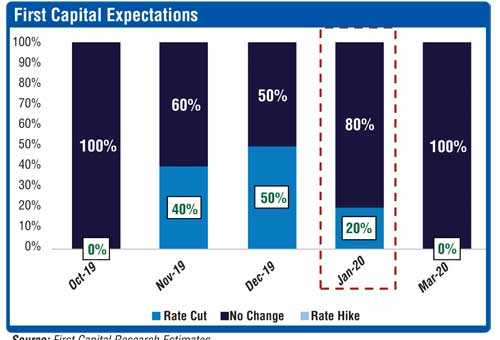Tuesday Feb 17, 2026
Tuesday Feb 17, 2026
Tuesday, 28 January 2020 01:26 - - {{hitsCtrl.values.hits}}
- CB expected to keep current rates due to tax relief, ongoing interest rate reduction
- Stimulus expected to spur growth turnaround in 1Q
- Possibility of tax relief leading to fiscal slippage also discourages further policy easing
- Inflation predicted to remain high in 1Q but not exceed 6%
- CB’s first monetary policy announcement on Thursday
First Capital Research yesterday predicted that the Central Bank would keep its policy rates unchanged this week, given the broad tax relief measures being rolled out by the Government, and a reduction in interest rates that is expected to spur growth in 2020. 
In the last policy meeting held in December, the Central Bank of Sri Lanka (CBSL) maintained its accommodative monetary policy stance at current levels immediately following the tax revisions, with the belief that it would support higher economic growth in the short term, First Capital Research said in its latest pre-policy report. The Central Bank will release its monetary policy stance on Thursday.
“Considering the recently provided tax revisions and other benefits, we were of the view that continuation of policy rates was appropriate at that economic juncture. However, we also assigned a 50% probability for a rate cut in December 2019 considering urgency to improve the lending and economic growth,” the statement said.
Considering the recent major fiscal and monetary policy changes, First Capital Research believes that the current accommodative monetary policy stance is appropriate, and that there is ample space for market lending rates to reduce without a further adjustment in policy rates. Already announced tax relief and a proposed moratorium on capital repayments of bank loans for the Small and Medium Enterprise (SME) sector are likely to provide further impetus to the economy.
“Accordingly, we assign an 80% probability for no change in policy rates in the upcoming policy announcement and expect policy rates to hold in the 1Q of 2020. However, we assign a lower probability of 20% for a lower rate cut in January with the urgency of boosting revival of economic activities. We continue to maintain that the Statutory Reserve Ratio (SRR) is likely to be maintained at the current level.”
Sri Lanka’s economy grew by 2.7% in 3Q2019, higher than First Capital’s expectation of 2.2%, indicating a gradual recovery relative to 2Q2019 growth of 1.6%. Private sector credit growth also recorded an increase of Rs. 47.1 billion in November 2019, illustrating a positive credit growth for the fourth consecutive month with January-November 2019 growth at 3.5%, closing in on the credit growth target of 5% for 2019E.
“Going forward, a steady revival of economic activity is envisaged, supported by potentially further improved political stability after the General Election in 2020 and in line with the measures taken to stimulate the economy such as SME and an extended tourism moratorium, tax benefits and Capital Adequacy relaxation on banks.”
As an extension to the stimulus package previously granted, the Government took measures to remove DRL imposed on banks and NBFIs and revise downwards corporate tax rates across all sectors. First Capital expects the additional support given with the above measures to further enhance growth in the economy.
“However, the Government’s ability to bridge the revenue loss due to the recent tax revisions will be a concern leading to a risk in 2020. The stimulus package may potentially lead to fiscal slippage, reducing the possibility of further monetary easing in the near term.”
Following a similar path as Fitch, S&P recently revised its rating outlook on Sri Lanka sovereign credit to negative from stable due to a larger-than-expected fiscal deficit and concerns over indebtedness. Despite the negative rating outlook revision, in line with First Capital Research’s expectations, Sri Lanka’s government securities market witnessed a net inflow since the beginning of 2020 amounting to nearly Rs. 5.5 billion and is expected to gradually improve during 1Q2020 with the settling of political uncertainty to a certain extent.
Inflation is to remain at low single-digit levels and stabilise within 4-6% while market lending rates are expected to reduce further.
“Inflation, as measured by CCPI, accelerated in December 2019 to 4.8% YoY driven by food inflation. However, we expect gradual acceleration in inflation to continue in the first half, primarily driven by the supply side shortage relating to food due to the floods in November. However, inflation is only likely to rise to around the 6% mark as tax cuts are expected to partially offset food inflation. Moreover, market lending rates are expected to continue to adjust downwards in response to monetary and regulatory measures taken by the Central Bank.”